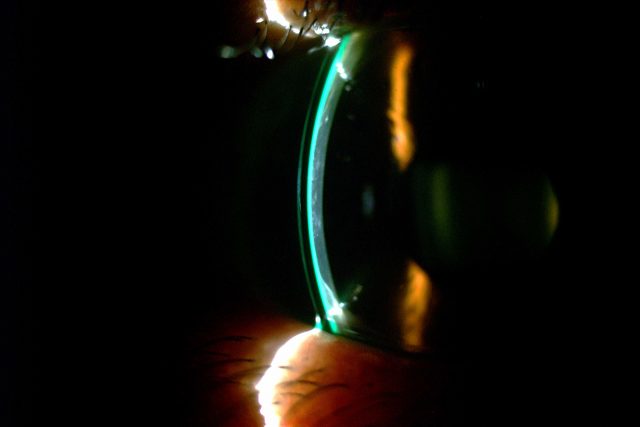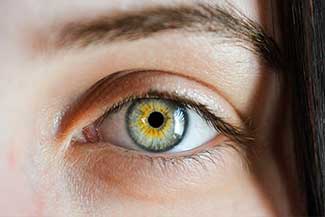
Scleral Lenses For Keratoconus And Other Eye Conditions
The cornea, which is the clear tissue on the eye’s outermost surface (covering the pupil and the iris), bends and focuses light going into the eyes. However, for those with irregularly-shaped corneas, the light entering the eye is not properly focused — which results in distorted vision.
Thankfully, scleral lenses offer excellent visual acuity and comfort for those with corneal irregularities, due to their large shape, unique features and customized fit.
Scleral Lenses for Keratoconus
Keratoconus (keh-rah-toe-cone-us) is an eye disorder in which the round dome-shaped cornea progressively thins, causing a cone-like bulge to develop.
Because patients with keratoconus have irregular, cone-shaped corneas, glasses cannot be used to properly correct vision. The ideal solution, therefore, are scleral contact lenses. They sit on the sclera without touching the cornea, while providing sharpness, clarity and comfort.
Scleral Lenses for Severe Dry Eye
People suffering from severe dry eye can find therapeutic benefits from transitioning to custom designed scleral lenses. Scleral lenses tackle three factors simultaneously: they provide vision correction, they protect the eye, and they serve a therapeutic purpose by lubricating the eye.
Scleral lenses also decrease pain, discomfort, eye redness and itchiness in those with dry eyes.
 Scleral Contact for Astigmatism
Scleral Contact for Astigmatism
Astigmatism is a refractive error caused by irregular corneal curvature, resulting in blurred and distorted vision. Scleral lenses offer exceptional vision correction in patients with astigmatism, whether by birth, following post-refractive surgery, or due to other corneal procedures. The lenses improve visual acuity and comfort while keeping eyes hydrated all day long.
Scleral Lenses for Myopia and Presbyopia
Scleral contacts are ideal for anyone with severe nearsightedness or farsightedness. For presbyopic patients, scleral contacts can be designed as multifocal contacts to correct nearsightedness and farsightedness simultaneously. Because scleral lenses are firmly positioned on the eye, they provide significantly more comfort when compared to standard multifocal lenses.
Mini Scleral Contacts Vs. Full-Size Scleral Contact Lenses
All scleral lenses rest on the white part of the eye, the sclera. However, Dr. Vikram Singh will customize the scleral lenses by determining the exact diameter and space needed between the cornea and sclera. Certain scleral lenses may have a space of a few millimeters (mini scleral lenses), while standard scleral lenses are larger, full-sized lenses. Larger scleral lenses are typically recommended for highly irregular corneas.
Ask Us About Scleral Lenses
If you struggle with keratoconus, astigmatism, dry eyes or any of the other conditions listed above, ask your Ancaster Scleral Lens Centre doctor about scleral lenses. Dr. Vikram Singh will patiently assess and explain your condition to you, and will perform a specialized, scleral lens custom-fitting to ensure that you receive the best fit for optimal visual clarity and comfort.
Call the Ancaster Scleral Lens Centre today to schedule your consultation.
Our practice serves patients from Hamilton area, Burlington, Brantford, and Cambridge, Ontario and surrounding communities.













